Keresés: %s
Keresés: %s
Hungary and Indonesia gives the baton to Kazakhstan and Japan at the CTBT Conference
UN Secretary-General Ban Ki-moon, foreign ministers and other high-level representatives of States Signatories to the Comprehensive Nuclear-Test-Ban Treaty (CTBT) gathered at the UN Headquarters in New York on 29 September 2015 to promote the entry into force of the Treaty that bans all nuclear testing.
Hungary and Indonesia is succeeded by Japan and Kazakhstan as co-chairs of the Article XIV Conference, two countries with incredible moral authority and a wealth of hard-earned knowledge when it comes to nuclear disarmament.
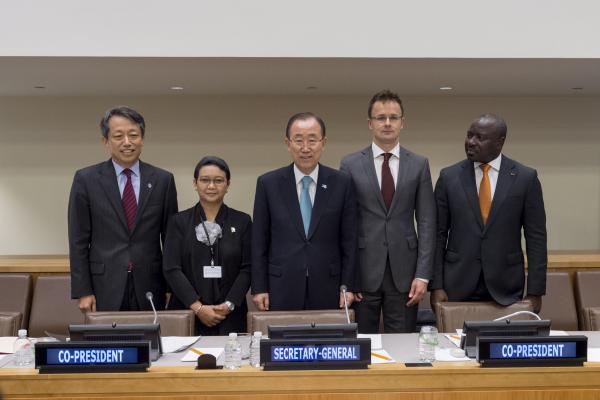
The Article XIV. Conference concludes the two-year period between 2013 and 2015, during which the Foreign Ministers of Hungary and Indonesia coordinated efforts related to the early entry into force of the Treaty. During the two year period three more countries, namely Niue, Congo and Angola, have ratified the Treaty.
Despite 183 signatory and 167 ratifying States, the Comprehensive Nuclear Test Ban Treaty (CTBT) has yet to come into force, due to the non-ratification of 8 nuclear powers, the remaining so called Annex-2 States.
In his concluding statement H.E. Péter Szijjártó, Minister of Foreign Affairs and Trade has emphasized that “only a Treaty in force will confine the chapter of nuclear testing to history books” and appealed to all States to make their utmost effort to achieve the entry into force of the CTBT at the earliest possible date.
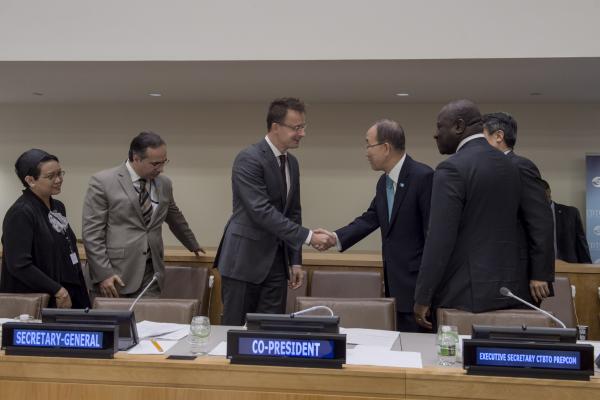
Please find the full statement of Minister Szijjártó here.
Minister Szijjártó had talks regarding development of Central-European north-south infrastructure and management of crisis
Minister of Foreign Affairs and Trade Péter Szijjártó had talks on Tuesday in New York regarding the north-south infrastructure development of the Central-European region between the Adriatic Sea and the Baltic Sea and the global management of the crisis.
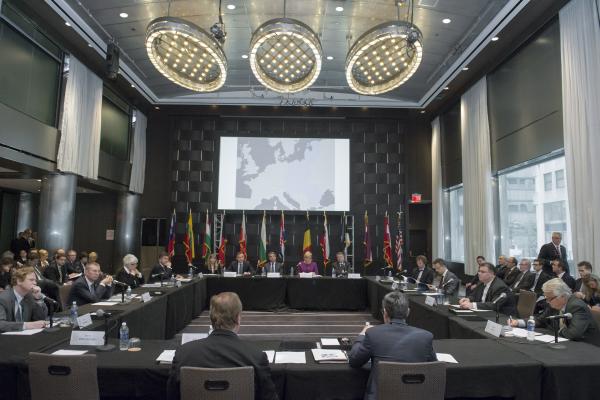
The Minister told the Hungarian News Agency MTI that the attendees of the first meeting of the Adriatic-Baltic-Black Sea cooperation forged with the participation of 12 countries at the initiative of Croatian President Kolinda Grabar-Kitarovic decided to maintain this form of cooperation and to hold their next meeting in Zagreb in 2016.
“We have resolved to create the region’s north-south-bound infrastructure, which is as yet missing, in the fields of energy, transport and digital communication, through joint action for the acquisition of EU funds and talks”, the Minister said.
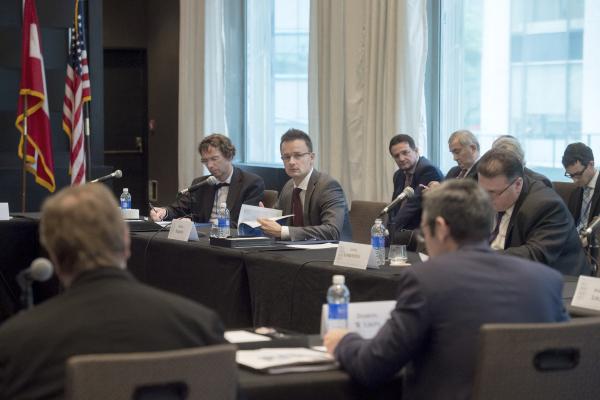
Bilateral meetings of Minister Szijjártó
On the margins of the high level week of the 70th session of the UN General Assembly, Minister of Foreign Affairs and Trade Mr. Péter Szijjártó participated in bilateral meetings with foreign ministers, high level UN officials and former Governor of New York, Mr. George Pataki.
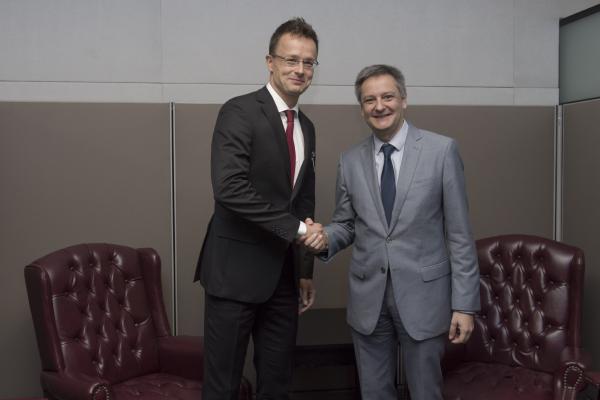
The Minister of Foreign Affairs and Trade had bilateral meetings with Minister of Foreign Affairs of the Principality of Andorra, Taíb Bakus; Kyrgyz Minister of Foreign Affairs, Charles Koffi Diby; Minister for Foreign Affaris of the United Arab Emirates, Sheikh Abdullah bin Zayed bin Sultan Al Nahyan; Secretary for Relations with States within the Holy See, Paul Richard Gallagher; Peter Boehm, Associate Deputy Minister at the Department of Foreign Affairs and International Trade Canada; and George Pataki, former Governor of New York.
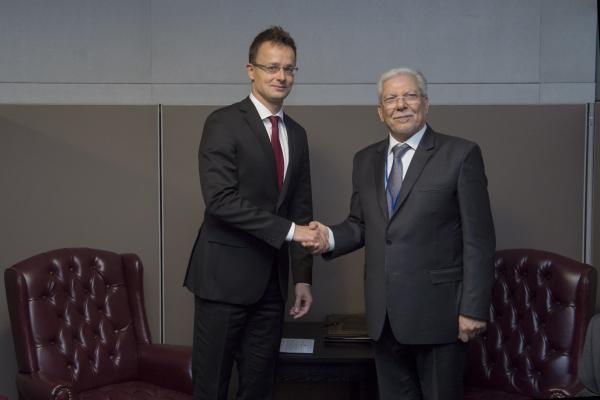
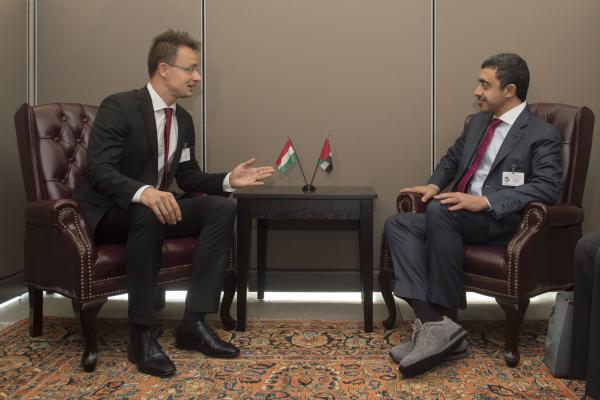
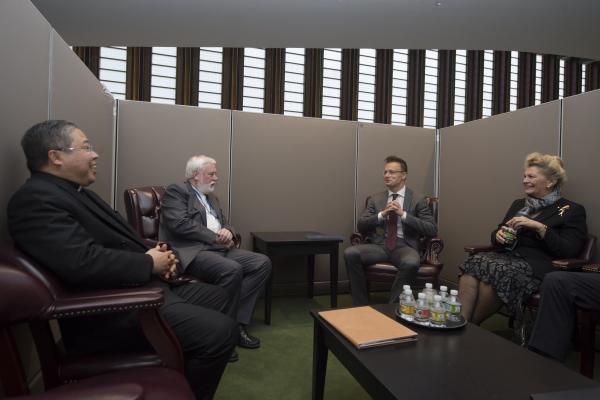
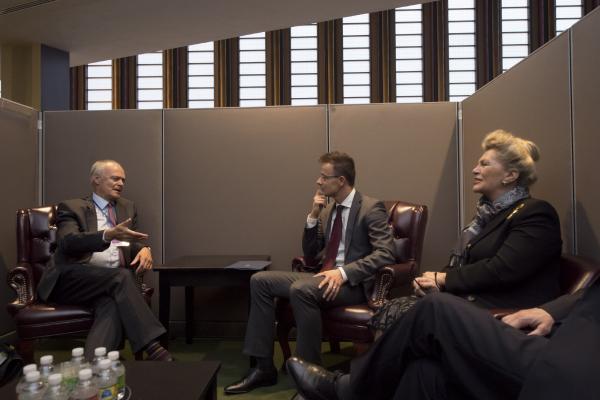
In additon, at the Permanent Mission of Afghanistan by the UN, Minister Szijjártó and Minister of Foreign Affairs, H.E. Salahuddin Rabbani signed a memorandum of understanding between the foreign ministries of Hungary and Afghanistan.
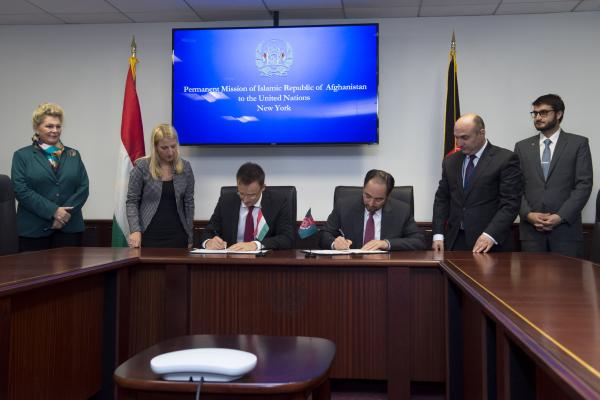
Furthermore, to strengthen ties between the UN and Hungary, the Minister met with Jeffrey Feltman, Under-Secretary-General for Political Affairs and Deputy-Secretary-General Jan Eliasson.
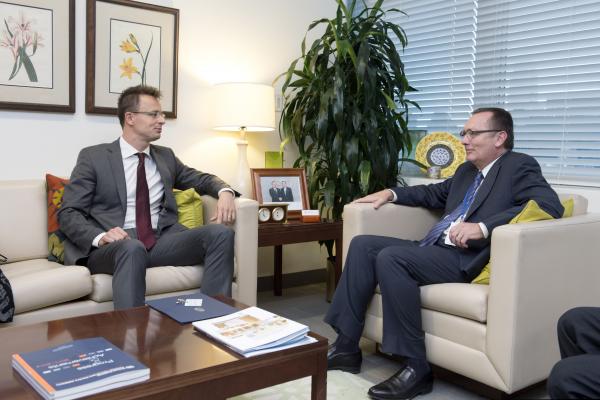
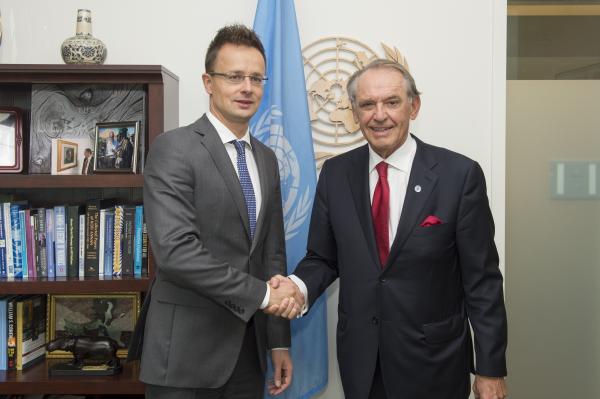
Hungary will propose introduction of global migration quotas in the UN
Minister of Foreign Affairs and Trade Péter Szijjártó is leading the delegation for the 70th session of the United Nations General Assembly. The focus of the Hungarian message to the world leaders is the extent and gravity of the unprecedented challenges, which Europe is required to face for the first time since World War II.
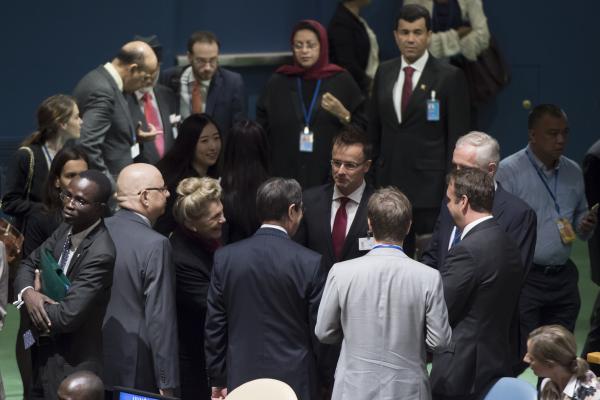
The Minister, who will address the 70th Session of the UN General Assembly, will participate in meetings with top UN leaders and Foreign Ministers of various states, as well as the Foreign Ministers of the 28 Member States of the European Union. He will also attend the summit on countering the Islamic State and violent extremism, chaired by President Obama; and the summit on the situation of migrants, convened by Secretary-General Ban Ki-moon. The Minister will further speak as departing co-chair at the conference of Article XIV of the Comprehensive Nuclear-Test-Ban Treaty.
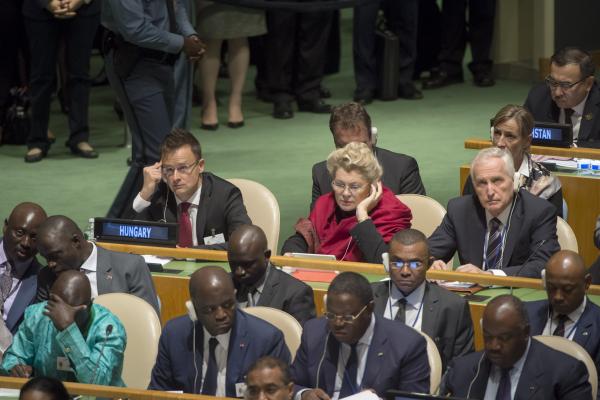
Prime Minister Orbán at the gala dinner with President Obama
On 28 Septermber 2015, Prime Minister Viktor Orbán attended the reception hosted by the President of the United States and Mrs. Obama on the occasion of the 70th Session of the United Nations General Assembly.
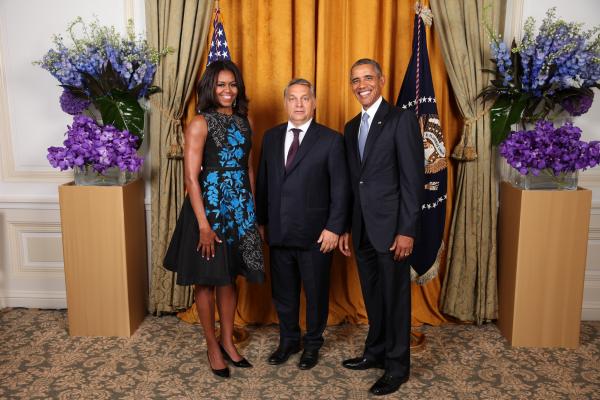
Foreign Affairs Council discussion on the fight against ISIL and the conflict in Syria
On 28 September 2015, the European Union’s Foreign Ministers met in New York on the margins of the high level week of the 70th session of the United Nations General Assembly, with the participation of Minister for Foreign Affairs and Trade, Péter Szijjártó.
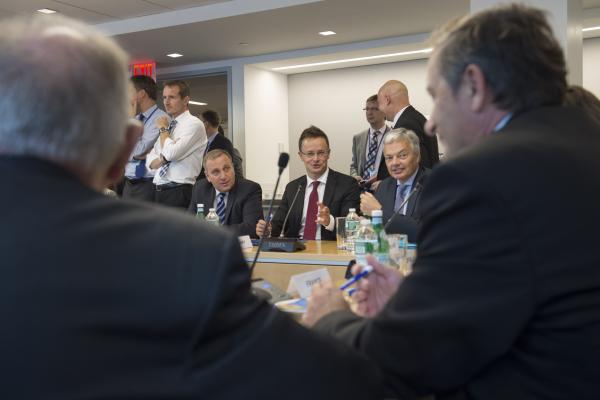
In her introductory remarks, Federica Mogherini, High Representative for Foreign Affairs and Security Policy stressed that in order to achieve success the fight against ISIL has to go hand in hand with the political transition in Syria. She emphasized that there is a pressing need for an overall common position, in order to enable the EU to play an instrumental role.
Both the migration crisis and the increase in Russian military presence in the region was regarded a game changer by United Nations special envoy for the Syria crisis, Staffan De Mistura. He underlined repeatedly the importance of a common narrative by the EU, which he thought would aid his work as a mediator.
Minister Szijjártó summarized the Hungarian position in four points:
1) Hungary is in agreement with Germany that the conflict moved into a new phase and there is a need for innovative solutions.
2) Hungary supports the initiative by Chancellor Merkel to involve those who have a stake in the conflict.
3) There is a need for partnership with Russia in the solution of the crisis.
4) We need to face the facts, that so far we have only reached limited success in the fight against ISIL.
President János Áder visited the Permanent Mission of Hungary
To conclude his official visit, H.E. President János Áder and the First Lady visited the Permanent Mission of Hungary and met with its staff.
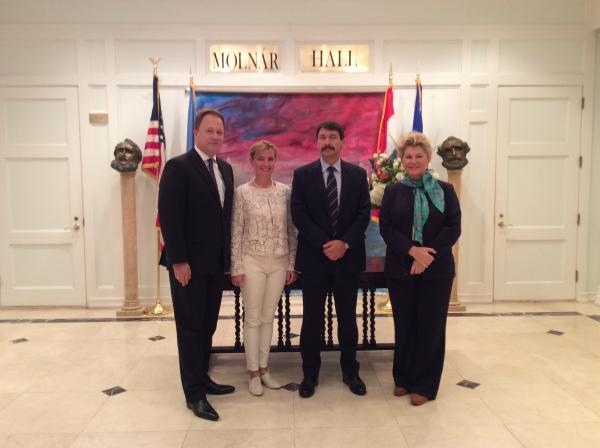
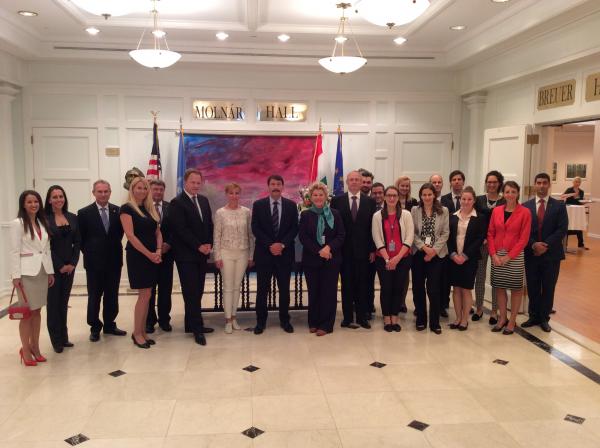
The President of Hungary consults the UN Secretary-General in New York
On 26 September 2015, H.E. Mr. János Áder, President of Hungary met with Secretary-General Ban Ki-Moon. They discussed ways and means to promote Sustainable Development Goals a day after the Heads of States and Governments adopted the 2030 Agenda.
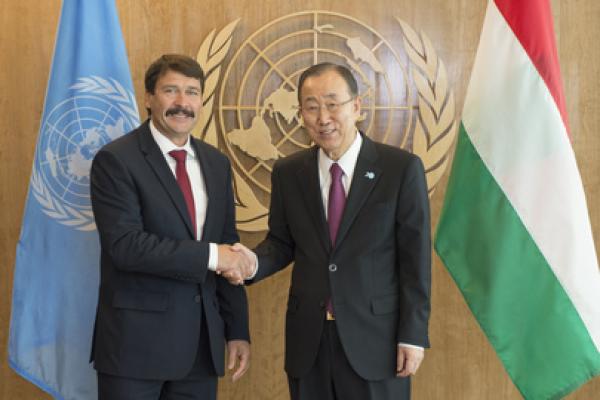
They also touched upon the increased movement of migrants and refugees towards Europe. The Hungarian President detailed the efforts by the government as well as civil society to help ease the situation of refugees and migrants in Hungary, while at the same time pointing out the complex nature of the phenomenon. The President requested the Secretary-General to continue his efforts aimed at strengthening the UN assistance provided to refugees worldwide. Hungary favors the increase in EU humanitarian support provided to the Syrian refugees in neighboring countries.
The President highlighted that, as an option for international action to tackle this global problem, the international community should also consider internationally relocating those who will not be able to return to their homeland in a short period of time.
During his official visit, President Áder also met with Andzrej Duda, President of Poland; Kolinda Grabar-Kitarovic, President of Coratia; Mr. Jerry Brown, governor of California; and Thomas Bach, President of the International Olympic Committee.
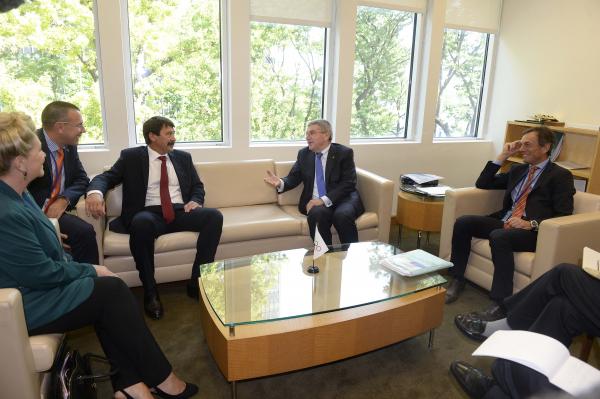
2030 Agenda for Sustainable Development adopted by consensus - Decisive climate action is also needed
On 25 September at the Sustainable Development Summit in New York Heads of State and Government formally adopted the 2030 Agenda for Sustainable Development, an ambitious and transformative package of 17 interrelated sustainable development goals and 169 targets that aim to end poverty by 2030, while balancing the economic, social and environmental pillars of development.
In his statement addressed to the General Assembly, H.E. President János Áder, Head of the delegation of Hungary underlined that the Agenda can only be implemented if Member States also take decisive climate action at the COP21 Conference to be held in Paris in December.
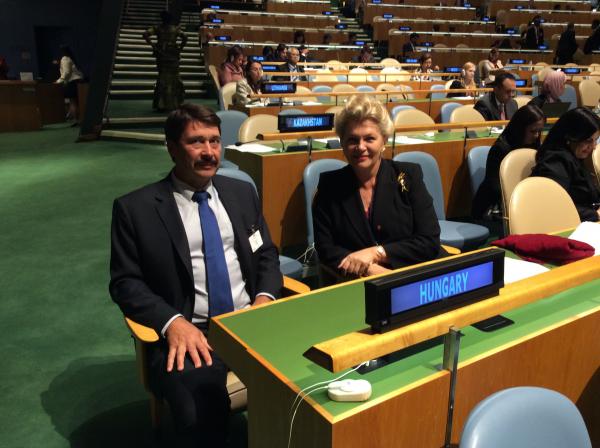
The 193 Member States of the United Nations General Assembly celebrated the ambitious new agenda that aims at ending poverty by 2030, while promoting shared economic prosperity, social development and environmental protection. Heads of State and Government have expressed their firm support for the agenda and their strong commitment to achieve its 17 goals and 169 targets that have been negotiated in the Open Working Group process under the stewardship of Kenya and Hungary. This agreement is a people-centered agenda that constitutes a historic turning point for our world, and for future generations with a view to leave no one behind.
After a long negotiating process that started in Rio in 2012, spanned more than three years, built on the outcomes of the Open Working Group and the International Conference on Financing for Development in Addis Ababa and culminated in a half year intergovernmental negotiation process, Member States, regional organizations, the United Nations, the private sector and all other stakeholders are entering to the phase of implementation.
While joining others in expressing gratitude to those who worked on this project, President of Hungary, H.E. János Áder underlined that the success of the agenda depends on whether Member States are willing to commit themselves to an ambitious and legally binding climate agreement in Paris this December at the 21st Conference of the Parties of the United Nations Framework Convention on Climate Change. If the climate objectives are not met, this will render hopeless the achievement of all other development goals. As Member States have little time left until COP21 President Áder strongly urged everyone to reconsider their positions before Paris.
Please find the transcript of President Áder's speech here.
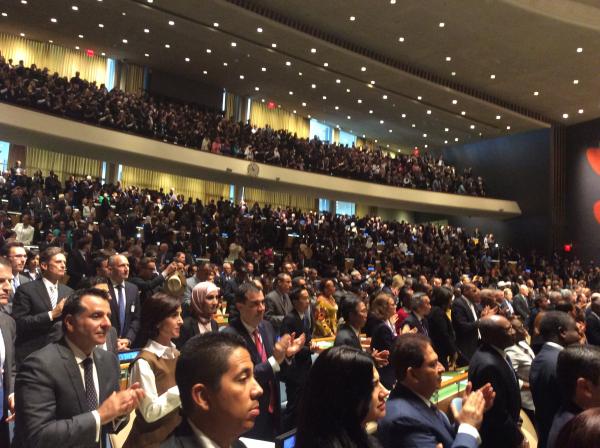
Pope calls on Member States to fulfill the promise of the 2030 Agenda
His Holiness, Pope Francis requested Heads of Governments and Heads of States to follow up the agreement on the 2030 Sustainable Development Agenda with concrete action, declaring the Agenda “a sign of hope for mankind”. He strongly supported the protection of environment, ending poverty for all, and requested that certain material (lodging, labor, land) and spiritual (religious freedom, civil rights) “minimums” be granted to everybody.
He cautioned that besides the goals, targets and indicators, decision-makers should always remember that the agenda is, first and foremost, about people. People of all social groupings have to be included and must become agents of change.
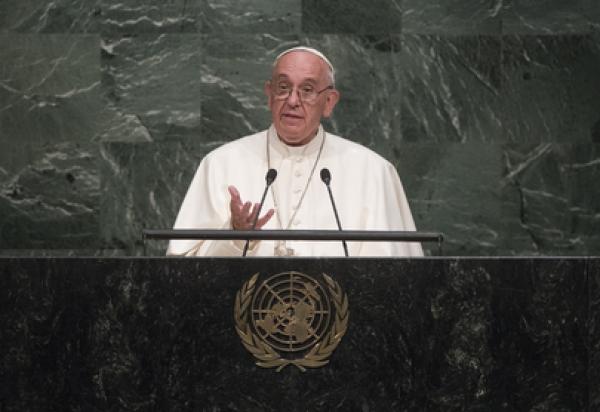
On 25 September His Holiness, Pope Francis addressed the largest number of Heads of Governments and Heads of States ever at the UN General Assembly, urging global action to protect the environment and end the suffering of "vast ranks of the excluded," saying that “human beings take precedence over partisan interests.”
The Pope spoke out against partisan interests, “the culture of waste”, selfishness, inequality and exclusion that are the root causes for the biggest global problems. He spoke strongly in favor of observing ethical norms and practical considerations in order to safeguard the environment and thereby, ensure the future of mankind.
The Pope was confident that the December Conference of States Parties to the UN Framework Convention on Climate Change (UNFCCC), widely referred to as COP 21, would secure fundamental and effective agreements.
The Pope also noted the achievements of the UN as it celebrates its seventieth anniversary. “The history of this organized community of States is one of important common achievements over a period of unusually fast-paced changes,” he said. “Without claiming to be exhaustive, we can mention the codification and development of international law, the establishment of international norms regarding human rights, advances in humanitarian law, the resolution of numerous conflicts, operations of peace-keeping and reconciliation, and any number of other accomplishments in every area of international activity and endeavor.”
His Holiness also cautioned that the experience of the last 70 years had made it clear that reform and adaptation to the times were always necessary.
The President of the Republic met with Mr. Henry Kissinger
H.E. President János Áder is heading the Hungarian Delegation for the United Nations summit for the adoption of the post-2015 development agenda, which will be held from 25 to 27 September 2015, in New York and convened as a high-level plenary meeting of the General Assembly.
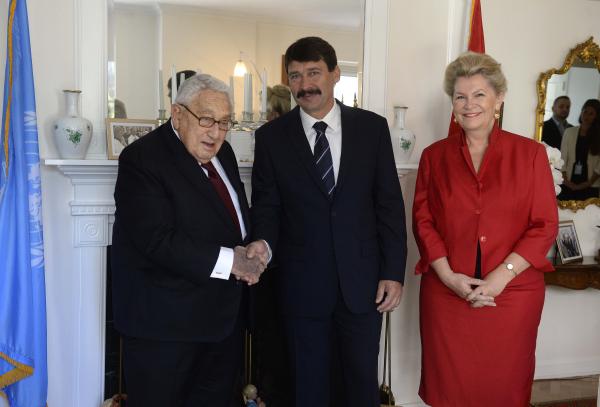
On the first day of the President’s official visit he met with Mr. Henry Kissinger at the residence of the Hungarian Permanent Representative, H.E. Ambassador Katalin Bogyay. The two had a breakfast meeting where they discussed the situation of refugees, the future of the European Unions and the topic of sustainable development.
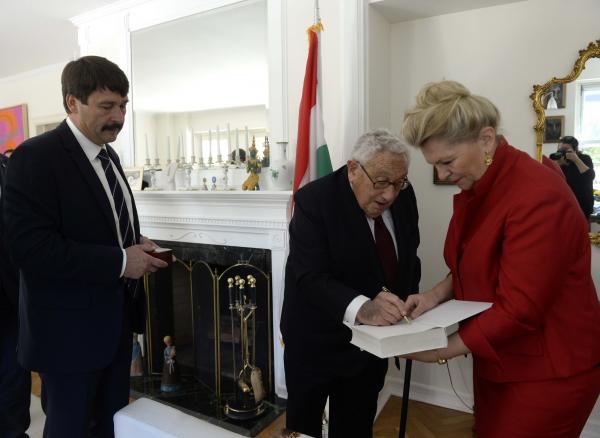
Hungary opens exhibit on the Holocaust of the Roma People
On 11 September 2015, Ambassador Katalin Bogyay hosted the opening ceremony of an exhibit entitled “Pharrajimos: Holocaust of the Roma People” at the Permanent Mission of Hungary to the UN. The exhibit was opened by Dr. István Mikola, Minister of State for Security Policy and International Cooperation, Ms. Cristina Gallach, UN Under-Secretary-General for Communications and Public Information and Mr. László Teleki, Member of the Hungarian Parliament.
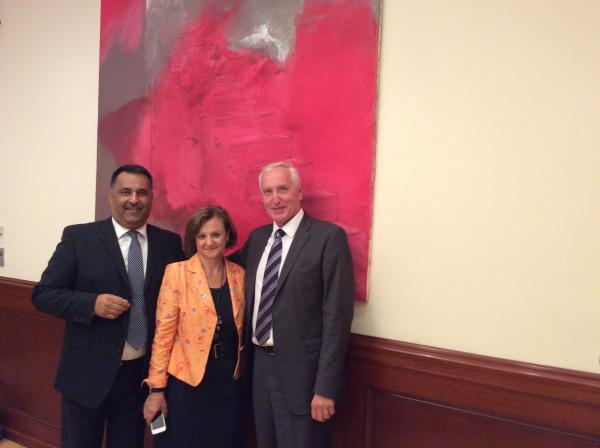
The exhibit at the Permanent Mission of Hungary commemorates the persecution of the Roma People during the Holocaust and is part of a series of events organized during Hungary’s Chairmanship of the International Holocaust Remembrance Alliance (IHRA). One of the priorities of the Hungarian IHRA Chairmanship is to raise awareness and facilitate more research about the Roma genocide during World War II.
In his welcoming remarks, Minister of State Mikola emphasized that Holocaust remembrance is key in fighting modern day racism and intolerance. An estimated 500,000 Roma were killed during the Holocaust but due to political circumstances the survivors were silent for decades after World War II. During Hungary’s Chairmanship, the International Holocaust Remembrance Alliance will raise awareness about this topic adding an important new dimension to the Alliance’s work.
UN Under-Secretary-General Gallach said that the Roma communities had long fought to have their suffering during World War II recognized. She thanked Hungary for organizing the event and added that the exhibit is a remarkable and moving demonstration of the efforts to fight hate and intolerance.
Mr. Teleki, who is one of the main organizers of the exhibit, said that the last cries of the victims of the Nazi death camps send a loud and clear message to our generations that antisemitism and racism must never be tolerated.
Roma musicians Béla Horváth and Antal Kopár performed traditional and contemporary pieces of Roma and Gypsy music at the event to honor the memory of the victims.
Please find the full statement of Minister of State Mikola here, Under Secretary General Gallach here and Mr. Teleki here.
To see the photo diary of the event, please click here.
Charity is not only about the rich giving to the poor - Radio interview with the Permanent Mission of Hungary
At Hungary’s initiative, the UN General Assembly designated 5 September as the International Day of Charity, to be celebrated annually around the world.
Charity plays an important role in alleviating human suffering within and among nations. The work done by charity organizations and individuals, either through volunteering or donations, will be crucial in making the new Sustainable Development Agenda successful. The international day serves as an opportunity for all stakeholders to increase public support for charity through awareness raising activities.
As part of this year’s commemoration, UN Radio made an interview with the Permanent Mission of Hungary to discuss the significance of charity in the UN’s work.
To listen to the interview by UN Radio, please click here.
"We live in extraordinary times!" - statement by H.E. Mr. László Kövér at the 4th World Conference of Speakers of Parliament
On September 1 2015, H.E. Mr. László Kövér delivered his speech at the 4th World Conference of Speakers of Parliaments.
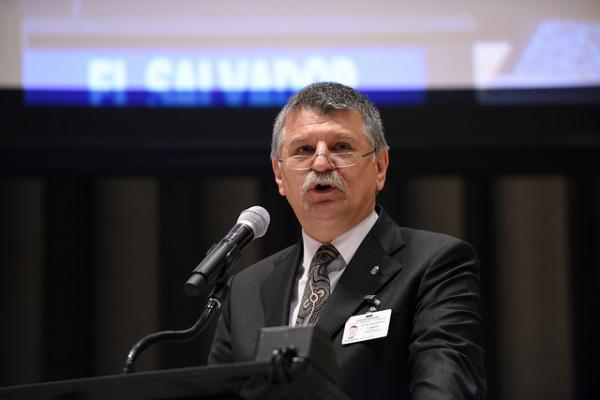
In his speech the Speaker highlighted the responsibility of the representatives of the institutions with the strongest democratic authorization in the world (e.g. national parliaments) to take action against any power attempting to corrupt the natural or social order.
The Speaker then addressed the importance of the Sustainable Development Goals as he spoke about the how most of today’s global crises are interrelated with the lack of sustainability.
He reiterated that from the very beginning, Hungary has been an active participant in formulating the sustainable development goals, as also the Constitution stipulates Hungary’s obligation to participate in international cooperation on sustainable development.
He then concluded that without a satisfactory system of sustainability institutions, however, reaching the Sustainable Development Goals remains an illusion.
To see the entire speech, please click here.
H.E. Mr László Kövér, Speaker of the Hungarian Parliament at the World Conference of Speakers of Parliament
The 4th World Conference of Speakers of Parliament, convened by the Inter-Parliamentary Union (IPU), kickstarted on 31 August 2015. The Hungarian delegation is led by H.E. Mr. László Kövér, Speaker of the Hungarian National Assembly. Among the distinguished participants are Mr. Saber Hossain Chowdhury, President of the IPU and Ban Ki-moon, Secretary General of the United Nations and this year's keynote speaker was Mr. Forest Whitaker.
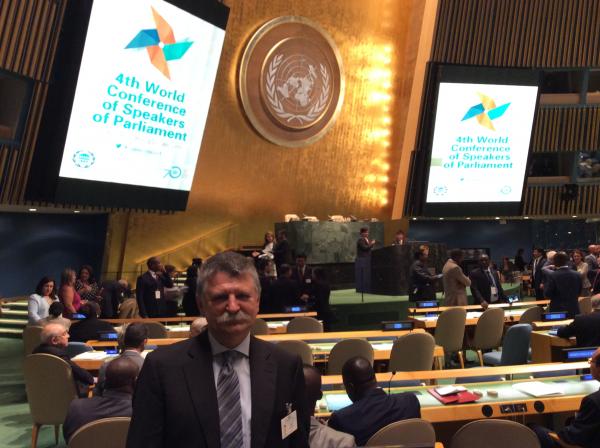
H.E. Mr. László Kövér, Speaker of the Hungarian National Assembly
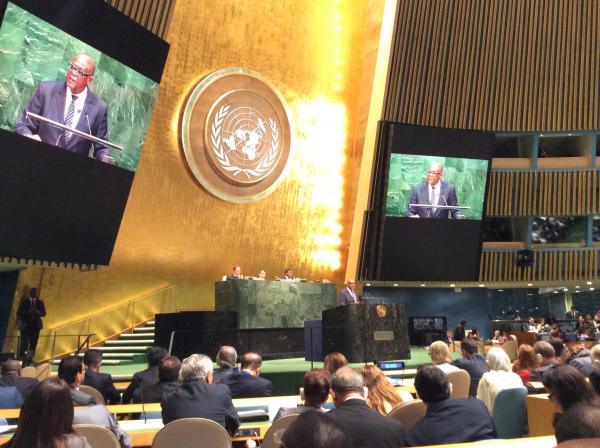
keynote speaker was Mr. Forest Whitaker
New Development Agenda charts ambitious path
On 2 August UN Member States have reached agreement on the 2030 Agenda for Sustainable Development that will be adopted this September at the Sustainable Development Summit in New York.
Hungary celebrates the ambitious new agenda that aims at ending poverty by 2030; promote shared economic prosperity, social development and environmental protection. The negotiation process was brought to its successful conclusion under the excellent leadership of Kenya and Ireland. Hungary joins all Member States and stakeholders in appreciation of their work. At the center of the Agenda, are the 17 goals and 169 targets that have been negotiated in the Open Working Group process under the stewardship of Kenya and Hungary. It also builds on the successful Addis Ababa Summit on Financing for Development.
The draft agreement can be found here.
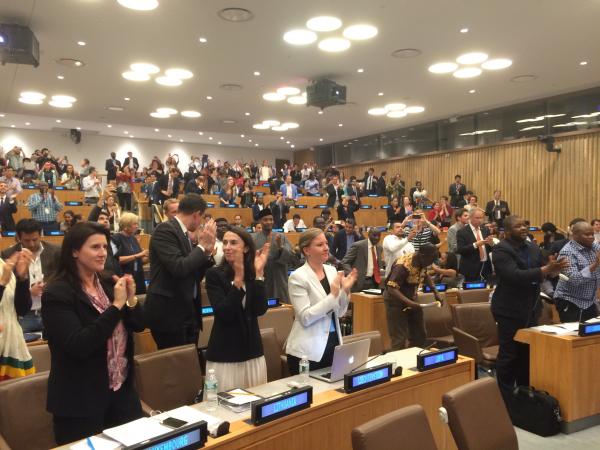
Hungary spearheads discussion on national implementation and monitoring of SDGs
On 20 July, 2015,Hungary, in cooperation with Viet-Nam and the Asia-Europe Foundation (ASEF), organized a full-room side-event on the margins of the Post-2015 intergovernmental negotiations. Participants reviewed national perspectives on implementation frameworks based on individual country experiences, as well as entered into a dynamic discussion on the role of, and challenges related to, data gathering and statistics.
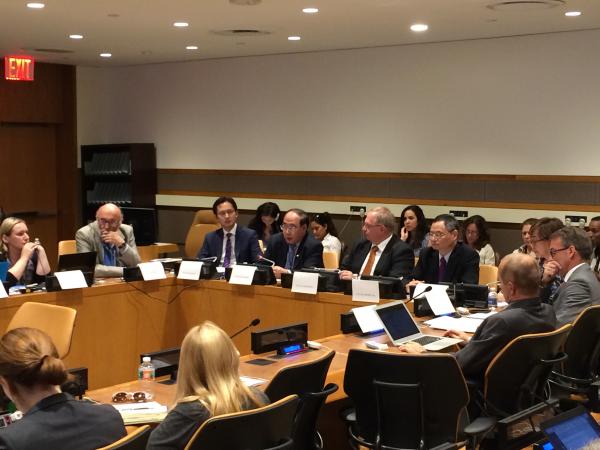
H.E. Zhang Yan, Executive Director, ASEF introduced the work of The Asia Europe Foundation in the field of sustainable development, in the spirit of working across the traditional North-South Divide.
In his opening remarks H.E. Dr. Zsolt Hetesy, Deputy Permanent Representative, emphasized that national implementation of the Agenda will require a true paradigm change. The agenda is not only transformative, but also universal, as it speaks to 193 countries. More importantly, implementation will involve not only governments, but all stakeholders, governments, financing institutions, the private sector, volunteers, NGOs, etc. Therefore, all countries will have to undergo a ‘fit for purpose’ exercise with regard to decision making, implementation, review and monitoring. He then spoke on the role of indicators, statistics and reliable data for the Agenda (please see our previous post on the initiative for a resolution on World Statistics Day). The role of data and statistics is not limited to the monitoring the SDGs, but includes facilitating decision-making and mobilization.
In his Keynote Speech UN Under-Secretary-General for Economic and Social Affairs, H.E. WU Hongbo, highlighted the role of Hungary in the Open Working Group and in the field of Statistics. He underscored the importance of review, monitoring and data, while also emphasized the need for national governments to use “whole-of-government” approach and leave behind the silo thinking. “Delivering a one” must be true for the UN and the member states, alike.
Through the case studies of Poland and Viet Nam it was highlighted that despite different socio-economic systems, Countries will have to use similar strategies to deliver on the agenda.
During a lively discussion on data collection and statistics, it was underlined that in order to effectively monitor the progress made, new sets of data, statistics and indicators, new types of policies and also new techniques for reporting and monitoring are needed.
For media coverage of the event, please see below:
International Institute for Sustainable Development
Asia-Europe Foundation
High Level Event on Climate Change
H.E. Ambassador Katalin Bogyay, Permanent Representative of Hungary to the United Nations delivered a statement at the High-Level Event on Climate Change organized by the President of the United Nations General Assembly on 29 June 2015.
To the initiative of the President of the United Nations General Assembly a High-Level Event on Climate Change was held on 29 June 2015 in order to highlight the importance of keeping focus on the issue of climate change and to provide impetus and momentum towards reaching an agreement on climate change at the 21st session of the Conference of the Parties to the UNFCCC in Paris, in December 2015.
In her statement Ambassador Bogyay underscored Hungary’s commitment towards the global effort tackling climate change. She reminded that the a single, global and legally binding agreement at COP21 can only be reached if all the member states engage actively and change gears during the remaining negotiation sessions.
The Ambassador informed the membership about the contribution of János Áder, President of Hungary to the efforts of the United Nations through joining the initiative “Live Earth” which aims to unite a billion voices to deliver a single message: To take climate action now! The Permanent Representative also emphasized that beside its dedication to developing international climate finance measures, Hungary has successfully introduced a number of mitigation and adaptation measures with a view to protect its natural resources and to reduce its emissions.
To read the full statement delivered by the Ambassador, please click here.
Hungary to co-host Inaugural “Chess for Dialogue” tournament in the United Nations
The inaugural “Chess for Dialogue” tournament was organized by the Permanent Missions of Hungary and Ukraine at the UN Headquarters on 18 June 2015. The event was opened by. H.E. Mr. Yuriy Sergeyev, Permanent Representative of Ukraine to the UN, Ms. Hua Jiang, Officer-in-Charge, UN Department of Public Information and H.E. Mr. Zsolt Hetesy, Deputy Permanent Representative of Hungary to the UN.
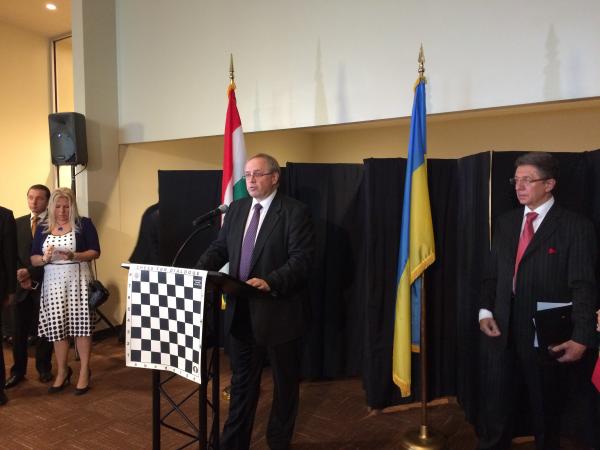
Ms. Jiang conveyed the message of UN Secretary-General to the participants of the event. In his message, the Secretary-General highlighted the role of chess in building friendships across the barriers of language, age, gender, physical ability or social status. “In a world torn by crisis and division, chess can help promote mutual respect.” He added that the characteristics and values of chess can help the United Nations achieve its goals.
The goal of the “Chess for Dialogue” initiative is to raise awareness of the potential of chess as a tool of soft diplomacy which can contribute to the objectives of the United Nations in line with the mandate of the UN Office on Sport for Development and Peace. The event is supported by the world-renowned Hungarian Grandmaster Ms. Zsuzsa Polgár who is the Honorary President of the tournament.
The game was opened by Assistant-Secretary-General Kim Won-soo and Ms. Zsuzsa Polgár who made the first symbolic move. During the main part of the event, a group of UN Ambassadors representing every region of the world played with young talented chess players from the New York City area.
To see the photo diary of the event, please click here.
Ambassador Katalin Bogyay participated in the High Level International Conference on the implementation of the International Decade for Action “Water for Life” 2005-2015
H.E. Ambassador Katalin Bogyay, Permanent Representative of Hungary to the United Nations was invited to participate in the High Level International Conference on the implementation of the International Decade for Action “Water for Life” 2005-2015 held on 8-11 June 2015 in Dushanbe, Tajikistan.
Ambassador Bogyay participated in the High Level International Conference which aimed at reviewing the results of the International Decade for Action “Water for Life” and furthering efforts to achieve the sustainable development of water resources.
As a panelist Ambassador Bogyay engaged in the High Level Roundtable organized by the UNESCO International Hydrogeological Programme which focused on the role of water cooperation in achieving water related sustainable development goals. In her presentation the Ambassador, among other things, highlighted the centrality of scientific cooperation and underlined that water is a platform for cooperation rather than a tool for conflict.
In the side event organized by the Women for Water Partnership she argued for the importance of supporting women as agents of change in water who play an essential role in realizing sustainable water management and in achieving a water-secure world. Furthermore, she underscored the need to advance a gender perspective in the implementation of the post-2015 development agenda at both the global and national levels.
